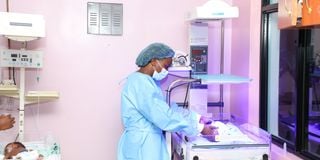Why Nakuru medics encourage fathers to take part in Kangaroo care

Dr. ALice Nkirote, a consultant pediatrician and head of the pediatrics department at PGH mother baby, during a routine visit at the Neonatal Intensive Care Unit (NICU).
Preterm infants, born before their duedate, face a myriad of challenges as their tiny bodies are extremely fragile, their underdeveloped lungs make breathing difficult, and even small movements require careful handling to avoid injury.
More often than not, mothers, on top of post-partum depression and other challenges, must cope with the added stress of caring for a preterm baby.
In these critical moments, fathers can step in to provide support through practices like Kangaroo Care.
This year, as the county marked the global Day of Prematurity on November 17, medics in Nakuru emphasized that when fathers actively participate, the baby’s chances of survival and healthy development improve significantly.
Dr. Alice Nkirote, a consultant paediatrician and head of the paediatrics department, says that to promote family-centred care, they involve families in the care of new-borns from the very beginning.
“We have practices that we actively involve them in, such as Kangaroo Mother Care. But remember, it's not just supposed to be Kangaroo Mother Care. It can also be Kangaroo ‘Father’ Care, and we are really emphasizing the role of fathers in the care of preterm babies,” she says.
She notes that fathers in the Kangaroo Care unit at the Mother-Baby Wing of PGH hold their babies skin-to-skin, helping to regulate temperature, stabilize breathing, and promote weight gain, and that this should occur for at least 18 out of 24 hours.
They also share the emotional load with the mother, offering comfort and reassurance while strengthening the bond with their child.
In Nakuru County’s Mother-Baby Wing, prematurity accounts for a large share of new-born admissions. Doctors say that nearly half of the babies in the new-born unit are born too soon.
She explains that many preterm infants need sustained warmth, breathing support, and feeding help to survive and thrive.
With around 1,000 deliveries a month and a significant portion arriving via caesarean section, the pressure on the facility is immense.
"We get new-born admissions of between 160 and 230 babies every month. And at any one time, we have between 50 and 70 babies admitted within the new-born unit. Now, what you'll realize is that out of those admissions to the new-born unit, approximately half are preterm babies who are admitted within the unit,” Dr. Nkirote explains.
She says that the preterm babies range from the tiniest of the babies, with some weighing as little as 500 grams, to those close to full term.
“Fortunately, in our unit, we can provide both basic and advanced care for new-borns, including preterm babies. Because we are able to do continuous kangaroo mother care, we provide the necessary warmth for these babies. We also support breastfeeding right from the start and ensure they can sustain it in addition to other care,” she says.
